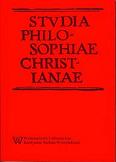Integralność poznania ludzkiego w ujęciu Błażeja Pascala. Z dziejów filozofii zdrowego rozsądku
The integral character of human knowledge according to Blaise Pascal. on the history of the philosophy of common sense
Author(s): Stanisław JaneczekSubject(s): Philosophy, Epistemology, Early Modern Philosophy
Published by: Wydawnictwo Naukowe Uniwersytetu Kardynała Stefana Wyszyńskiego w Warszawie
Keywords: Pascal Blaise; Descartes Rene; Reid Thomas
Summary/Abstract: This paper discusses the conception of knowledge according to Blaise Pascal against the backdrop of epistemological discussions in the seventeenth and eighteenth centuries. It indicates the integral character of human knowledge as postulated by Pascal. This knowledge should combine reason, conceived in the sense of discourse, with intuition and instinct; on the other hand, it should combine natural knowledge and faith. Pascal goes beyond an array of truths accessible in the knowledge based on discourse (raison). He attributed a special role to intuition defined in terms of sentir or even instinct, using such categories as esprit de finesse, identified with sens droit or esprit de justesse, the categories essential in the knowledge of principes. At the same time this kind of endowment of the human mind (lumière naturelle) corresponds in some respects to the knowledge grounded on cœur, the knowledge set in opposition to raison, rationalistically understood, whereas in religion lumière naturelle is complementary to inspiration or révélation. This approach, opposite to the naturalistic manifestations of rationalism, seems to belong to a long history of common sense philosophy that takes into account the realities of human nature. It goes back to Aristotle, despite the modern contestation of his doctrine. The point of reference for Pascal is, above all, Descartes’s epistemology. The French philosopher stressed the importance of the a priori elements of knowledge, the elements treated as a natural endowment of the human mind, to which intuition or instinct refer. As a result of the integral character of knowledge one approves of a philosophy that is conceived in a maximalist manner, even though this paradigm changed in modernity from metaphysical to epistemological. Now treating the then limitations with regard to metaphysics as a manifestation of minimalism, or even a peculiar agnosticism, does not seem to be justified. This is because of the fact that the modern paradigm had changed; it was epistemology that became the main territory on which basic philosophical debates were conducted. They brought about some definite solutions in worldview, solutions essential in view of the then domination of culture by religion. Perhaps it was the religious milieu that enforced metaphysical questions which would make up the foundation of religious worldview. In this context, the era’s education implemented this requirement. At the end of the Enlightenment it preferred the Scottish school of common sense philosophy, the school that defended the integral character of human knowledge up against any manifestations of philosophical minimalism, or even peculiar skepticism, in itself dangerous for the cultural order.
Journal: Studia Philosophiae Christianae
- Issue Year: 51/2015
- Issue No: 4
- Page Range: 5-73
- Page Count: 69
- Language: Polish

